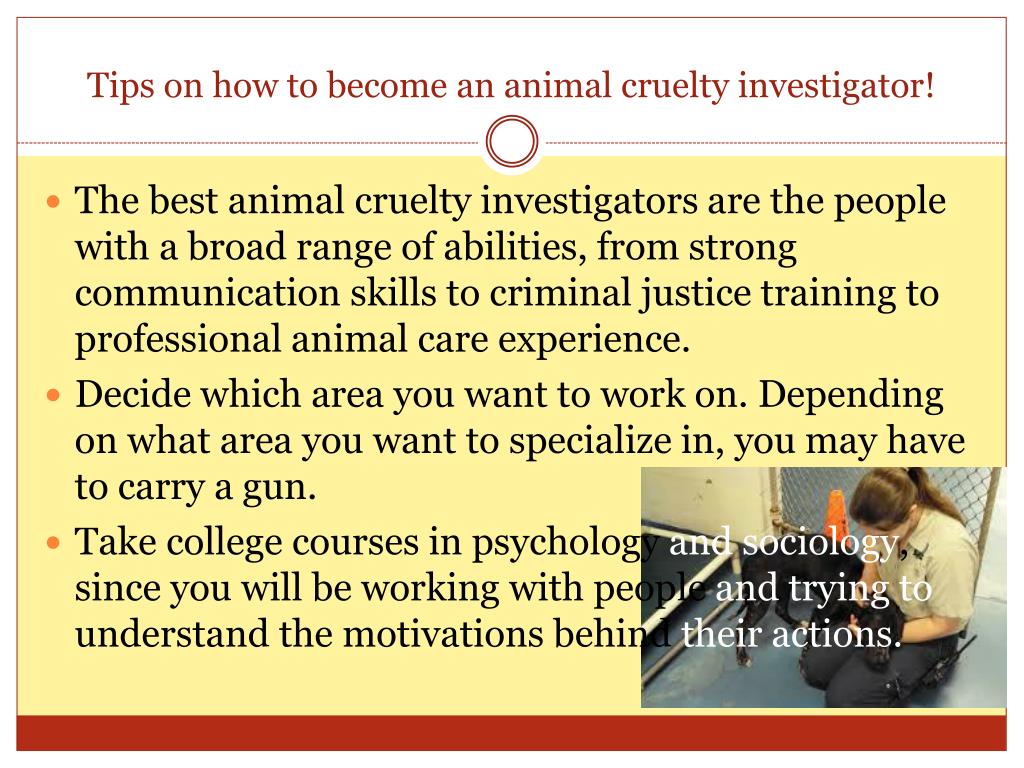In the picturesque state of California, the mountains stand lofty and the coastline stretches interminably, yet beneath its facade of natural beauty, a grave concern lurks—animal cruelty. This unfortunate reality has led to a burgeoning field dedicated to investigating and mitigating such abuses. For those who feel a calling to protect helpless beings, becoming an animal cruelty investigator presents a meaningful avenue of service. The journey towards this crucial role may seem daunting, yet understanding the necessary legal pathways can illuminate this potential career’s intricate landscape.
To embark on this journey, one must first understand the foundational knowledge that governs California’s animal cruelty laws. The state adheres to the animal cruelty statutes codified in the California Penal Code, particularly Sections 597 through 599. These laws encompass various acts of animal cruelty and neglect, including but not limited to torture, fighting, abandonment, and insufficient care. A profound understanding of these regulations is essential for any prospective investigator, as it forms the bedrock upon which investigations are built.
In order to effectively engage in this sector, it is advisable to secure a degree in a relevant field such as criminal justice, animal science, or veterinary technology. Each discipline contributes distinct skills and insights vital for this work. For instance, a background in animal science offers an in-depth understanding of animal behavior and welfare. Conversely, a degree in criminal justice provides insight into crime scene investigations, legal procedures, and ethical considerations pertinent to law enforcement. Individuals pursuing this path should prioritize education that emphasizes compassion and thoroughness in animal care.
Once educational foundations are established, aspiring investigators should consider gaining practical experience. Internships or volunteer positions with humane societies, animal shelters, or law enforcement agencies can provide invaluable hands-on experience. This engagement not only enhances one’s resume but also fosters an understanding of the daily realities faced by animal cruelty investigators. Additionally, networking within these organizations can open doors to mentorship opportunities, paving the way for future employment.
Obtaining certification can further bolster an investigator’s credentials. The Humane Society of the United States offers a specialized training program for animal cruelty investigators. This focused training encompasses various modules, including animal welfare laws, investigative techniques, and evidence collection methods. Although certifications may not be legally mandated in California, they signify professionalism and dedication to the field, often giving candidates a competitive edge when applying for positions.
Another essential aspect to consider is the role of local, state, and federal regulations. The investigation of animal cruelty often necessitates cooperation with law enforcement agencies, including local police, county sheriffs, and state agencies like the California Department of Fish and Wildlife. Familiarity with the procedural protocols of these agencies ensures that investigations are conducted within the legal framework, safeguarding both the animals involved and the rights of all parties. Understanding the nuances of interagency collaboration is crucial for the success of an investigation.
Communication skills are also paramount in this profession. An animal cruelty investigator must possess the ability to gather testimonials effectively, as witness accounts play a critical role in substantiating cases. Furthermore, emotional intelligence is vital when interacting with victims of abuse, whether they are human or animal. Bridging the gap between the concerned public and law enforcement requires a compassionate touch, accompanied by a steadfast resolve to advocate for the voiceless.
California’s unique climate creates complex scenarios regarding animal welfare, from wildfires impacting local wildlife to vast urbanization leading to increased companion animal population pressures. Therefore, staying informed about environmental influences and adapting investigation techniques accordingly is imperative. Continuous education through workshops, online courses, and conferences provides a platform for ongoing professional development, ensuring investigators remain equipped to address emerging trends and challenges in animal cruelty cases.
As the fabric of society evolves, so does the understanding of animals’ rights and welfare. Cultivating partnerships with local advocacy groups can enhance outreach and education efforts. Collaborating with organizations focused on animal welfare can amplify an investigator’s impact by fostering community awareness campaigns, thus empowering citizens to advocate for ethical treatment and reporting of animal cruelty. By becoming a beacon of change, investigators play an instrumental role in fostering a collective consciousness that condemns animal mistreatment.
The emotional toll of investigating animal cruelty should not be overlooked, as the job can often entail encountering some of the darker facets of humanity. Resilience and self-care are indispensable qualities that should not be neglected. Implementing strategies for stress management and seeking support from peers can help mitigate the psychological impact of the work undertaken. Ultimately, accomplishing such a role requires a symbiotic balance between emotional fortitude and professional detachment, enabling investigators to carry out their duties effectively without succumbing to despondency.
For those determined to traverse this pathway, the road may be fraught with challenges, yet it is laden with the potential for profound change. Each investigation unearths stories of untold suffering, but with courage and commitment, one can be the catalyst for healing and justice. As California continues to grapple with animal welfare issues, the need for dedicated animal cruelty investigators will only grow. By championing the cause of these innocent lives, individuals can not only forge thriving careers but also contribute substantially to the ethical treatment of animals across the Golden State.








